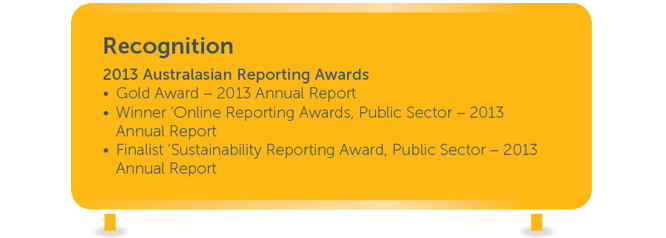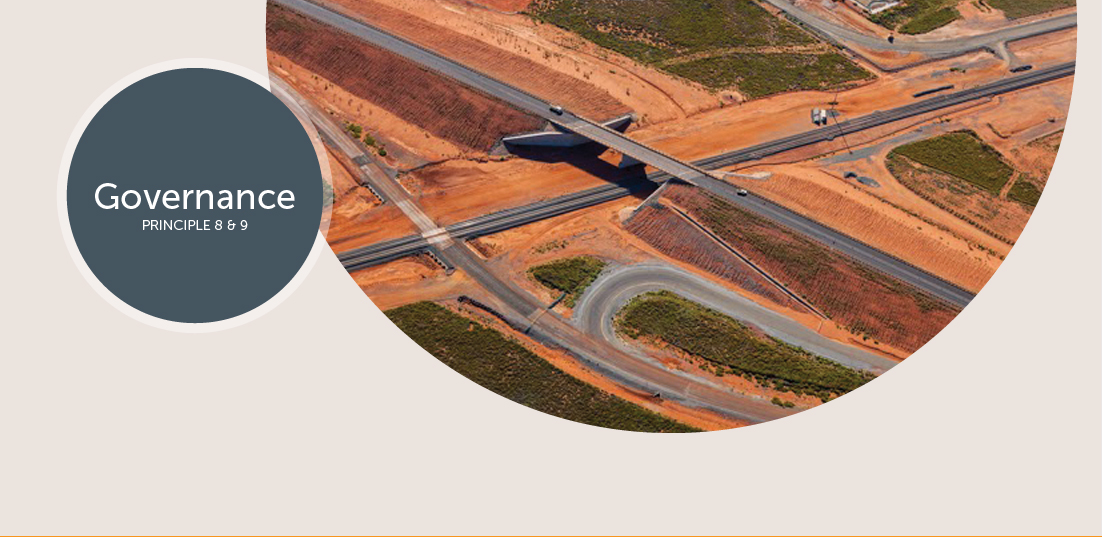
Principle 8: Communication
Internal Communications Plan
Our plan called Enhancing Internal Communication and Engagement was reviewed in April 2014 with the aim of improving communication throughout the organisation. This work was designed to engage employees via a consultative process rather than simply providing information.
Since the introduction of the plan, communications training has been run for staff that have identified communication and performance management competencies in their Individual Performance Agreements.
So far 119 employees have undertaken “Getting the Best out of Your Communication” workshops, which use HBDI profiling to create insight into participant’s personal communication and decision-making styles. They are then taught how to communicate with those who think the same as them and those who think differently.
We have also developed communication plans for important corporate initiatives such as our ‘Main Roads 2020 Strategic Plan’, Individual Performance Agreements, Leadership for Change Program and the Safety Strategy. The relevant communication strategy, “2020 Communications Plan” includes various actions to raise awareness and understanding of our strategic direction. These actions utilise our intranet site, branding, articles, participation from key stakeholders, and provision of two-way feedback opportunities to enhance internal communications.
We have conducted an internal branding review to redesign and update our employer brand marketing. New branding concepts have been used for our online job advertisements and for the promotion of our Development Employee programs both online and at careers expos.
Social Media Guidelines
We recognise that social media is evolving as a dynamic and effective way to communicate with internal and external stakeholders and customers.
We have an established set of Social Media Guidelines to raise our employees’ awareness of their responsibilities when using social media whether in a professional or private capacity.
The guidelines assist employees in identifying opportunities where social media can improve communication for specific events and campaigns.
Complaints Handling Process
We are committed to an accessible, fair and equitable complaints handling process that aligns our procedures with the Australian Standard for Complaints Handling (AS ISO 10002 – 2006). Information regarding the Policy is also readily available on our external website. The Corporate standard for response to complaints is 10 working days. Information regarding our process is provided to all employees through our intranet and during the induction process.
A monthly assurance check of this process is conducted via a complaints handling survey. This survey assesses our customers’ experience with their complaints process and how the complaint was handled.
Last year, 64% of people interviewed indicated that they were satisfied with how their complaint was handled.
Annual Report
We adopt a full, open and transparent approach when reporting on our operational and financial performance in our annual report. The report is also our medium for informing the public on our performance, expenditure of public funds and of any significant issues that occur. As only limited copies of the hard copy report are produced, an online version is available on our website.
In recognition of our high standard in annual reporting, we received a Gold Excellence Award for our 2013 report at the Australasian Reporting Awards. We also won ‘Best Online Report – Public Sector’ for the 2013 report which recognised that our report is accessible in an engaging way and was a Finalist for Sustainability Reporting in the Public Sector.
Managing our Records
We continue to provide a regime of best practice recordkeeping which supports meeting the legislative requirements of the State Records Act 2000. Our current Recordkeeping Plan (RKP) was approved in 2010 and is valid until October 2015 and provides overarching guidance in recordkeeping practices, disposal, policies’ practices and processes in line with the changing needs of an evolving workforce and how we do business.
Our services
We have adopted Australian Standards AS ISO 15489 – Records Management best practice recordkeeping and implemented the principles and standards established by the State Records Commission. This approach, balanced against the Public Sector Accountability, Integrity and Ethical Framework provides a solid foundation for efficient and effective service delivery to our customers.
In February 2014, staff across Main Roads were invited to undertake a satisfaction survey focusing on various corporate services offered throughout the organisation.
An overall rating of 90% was achieved by the Information Services branch (responsible for library and recordkeeping services), indicating that their approach to managing our records continues to be adopted and supported by the organisation.
Our response to future trends
System appropriateness and reliability is important to the effectiveness of the business and in addressing future directions. To ensure that we continue to operate according to best practice recordkeeping and meet the demands of a changing business and technological landscape we have developed a number of strategies alongside our ICT Plan 2013-2020 and 2020 Strategic Plan that support the evolution of our practices and provision of exemplary service. Some of the considerations and actions include:
- Upgraded primary recordkeeping system TRIM to the most recent version
- Investigation of alternative interfaces to act as a ‘user friendly’ front end for TRIM
- Continued review and evaluation of other products to ensure our needs are best met by current systems ∞ Development of a strategy to enable better data and knowledge sharing through enterprise level workflows across business units and information systems
- Establishment of policies and data classification to address future technological advances and their impact on recordkeeping e.g. cloud based services
- A realigned Information Services section that brings together various support areas and teams to provide a holistic service to better suit organisational needs
- Retention and Disposal strategies that provide a planned approach to address the existing backlog
- Two, three-year work programs detailing corporate and service delivery projects to improve recordkeeping across the organisation
Our Training program
Cultivating and consolidating our employees’ knowledge on best practice recordkeeping is paramount in preserving our corporate memory.
To achieve this we offer a number of training services and opportunities including:
- Training for all new inductees that addresses record keeping responsibilities and compliance with our recordkeeping plan as well as Recordkeeping Awareness and TRIM Online courses.
- New one hour intensive courses covering a range of recordkeeping topics run throughout most metro and regional offices and offered through teleconference sessions
- Full day hands-on TRIM training, also offered on a one on one basis including provision of remote online assistance.
- Regularly updated policies, procedures, quick reference guides, fact sheets, FAQs, news items, service provision, availability and contact points made available to our employees through our intranet site.
An overview of the participation in various recordkeeping training is detailed below:
| Training | Participants |
| Full Day TRIM training | 196 |
| TRIM’n’Win short course | 186 |
| Recordkeeping induction | 153 |
| Online – Recordkeeping Awareness | 134 |
| Online – TRIM Systems training | 88 |
| Annual Records Seminar | 24 |
| TRIM one on one | 5 |
| Regional and Metropolitan Buddying | 3 |
| Tailored Business Specific TRIM training | 2 |
| Work experience | 1 |
Freedom of Information
Certain documents can be obtained under the Freedom of Information Act 1992 (the Act). An information statement, which has been produced in accordance with the requirements of the Act, is available on our website. The statement provides a guide on how to obtain documents from us under the Act as well as information or documents available without a formal application. During the year, we received 40 applications.
Our Freedom of Information Coordinator can be contacted on 138 138.
Public Interest Disclosures
We are committed to the aims and objectives of the Public Interest Disclosure Act 2003. We recognise the value and importance of contributions by staff to enhance administrative and management practices and strongly support disclosures being made by staff regarding improper conduct.
The Public Interest Disclosure Guidelines are available on line to all staff, and have been incorporated into ongoing Fraud and Awareness training being rolled out to all areas of Main Roads through 2014.
Principal 9: Risk Management
Our Policy
Our Risk Management Policy states that we “manage all risks so that our business outcomes are achieved and our reputation is protected”. We achieve this through the following principles:
- Making risk management everyone’s responsibility
- Integrating risk management with business planning
- Capturing lessons learnt and implementing continuous improvement
- Establishing on-going control and accountability
- Taking the broadest approach possible, and identifying all risks.
Risk Management Process
We have established a systematic approach to enterprise wide risk management that brings various corporate risk management procedures and processes from across the organisation under one central process.
All employees have a responsibility to mitigate risk through the management and identification of risks that are a part of the work we undertake. We align our process to the Australian Standard AS/NZS ISO 31000:2009 – Risk Management. In addition, major capital works projects incorporate risk management processes to ensure project and operational risks are identified and managed where necessary.
Corporate Risk Management Reporting
As part of the ongoing Corporate Risk Management process, workshops are held across Main Roads to identify key operational and strategic risks facing individual directorates and business units, as well as the organisation as a whole. These workshops focus on the strategic and longer term impacts to our business.
Mitigating actions to address these risks have been incorporated within Directorate and Branch Business Plans and form part of the quarterly reporting and evaluation regime to Corporate Executive and across the organisation.


